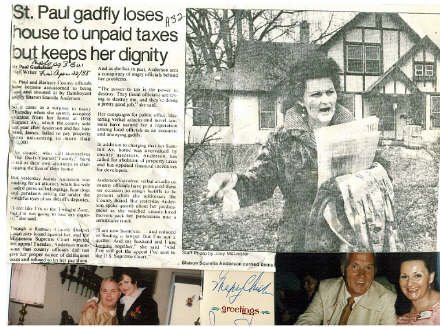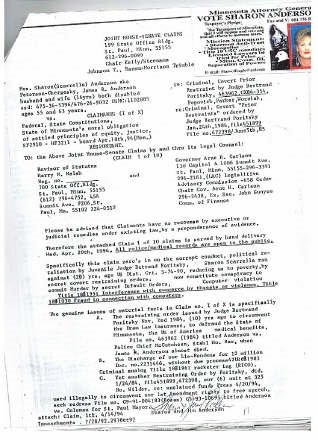City's hard lesson: Even a $1 price tag won't sell these houses
When you can't sell a home that you've priced at $1, what's your next step?
Cut the price to 50 cents?
Try paying someone to take the house for a buck?
St. Paul officials have learned some disappointing — but not surprising — lessons four months into a project to sell a cluster of city-owned homes at prices ranging from $50,000 all the way down to a buck.
In August, the city's Housing and Redevelopment Agency sponsored a series of open houses for the HRA-owned properties clustered along the west end of Fourth Street in the Dayton's Bluff neighborhood. City officials said they would sell only to buyers who showed they could finance extensive repairs that satisfy both city rules and historic preservation guidelines.
But despite heavy turnout at the open houses, the city has received only three purchase proposals thus far, said Sheryl Pemberton-Hoiby of the city's Department of Planning and Economic Development. Only one of the proposals, she added, likely will result in a sale.
Potential buyers have been daunted by the scope of rehab work needed on the houses, said Ellen Biales, aide to City Council President Kathy Lantry. Another concern: Many of the properties lack off-street parking.
"People want garages," said Pemberton-Hoiby.
As the number of foreclosures has skyrocketed in recent years in the Twin Cities and across the country, cities like St. Paul have taken on the role of buying houses to address a sharp increase in
vacant properties. Those vacancies can contribute to a downward spiral in values for other homeowners in the neighborhood.The result is that St. Paul now finds itself with not just the 11 homes in Dayton's Bluff, but another 59 properties spread across the city. About 30 of the homes likely will be demolished, but city officials hope to sell the others and promote neighborhood redevelopment efforts.
The Dayton's Bluff program — known as the Fourth Street Preservation Project — was meant to test strategies for how the city might best sell its homes. The key lesson learned thus far: More investment in rehabilitating the homes on the front-end is needed to entice buyers.
As one example, St. Paul is doing some initial surveying work to show potential buyers options for creating off-street parking at some of the Dayton's Bluff homes. The city also is considering improvements to exteriors and mechanical systems in the houses.
"People want to see the city's involvement — that they're not the only ones taking on the risk," Pemberton-Hoiby said.
With the additional investment, those $1 prices likely will be a thing of the past as the city looks to recoup the money.
In one respect, the city's effort has coincided with some helpful trends in the local housing market, where a lot of the activity among buyers has been focused on low-price homes.
Between December 2008 and last month, more than 12,000 homes priced at $120,000 or less have sold in the 13-county metro area, according to the Minneapolis Area Association of Realtors. That's a nearly 95 percent increase over the number of sales in that price bracket during the previous 12-month period.
Plus, there's been added incentive in recent months to purchase in Dayton's Bluff and nearby neighborhoods. In April, the Pohlad Family Foundation announced a $1 million grant to provide buyers in the 55106 ZIP code — an area that includes Dayton's Bluff — with $8,000.
But all of the foundation funds have now been committed, said Zong Vang of Dayton's Bluff Neighborhood Housing Services of St. Paul, the nonprofit group that is managing the grant money.
And the demand for low-price homes has been stoked by a huge supply of the properties, meaning buyers looking for discounted homes have had a lot of choices. The city's properties have been going up against some tough competition in the under-$100,000 price bracket, said Brad Griffith, an agent with Edina Realty who has worked with buyers and sellers on St. Paul's East Side.
Some buyers who've been looking for deals in homes priced at $25,000 to $40,000, Griffith said, wind end up opting for higher priced homes — say about $80,000 — when they see how the higher price tag translates into significantly less rehab work.
Griffith said he's not familiar with details of the Fourth Street Preservation Project, but suggested that city officials might want to consider working with local real estate brokers to market the homes. That way, the homes could be listed on the Regional MLS of Minnesota, a propriety database used by Realtors.
"The MLS is helpful from the exposure standpoint," Griffith said.
Better marketing would help the Fourth Street project, agreed Chuck Repke, executive director of the Northeast Neighborhoods Development Corp. But there have been other challenges.
Many recent buyers of homes under $120,000 are investors looking to rent the properties or sell them following rehabilitation. The city wants to sell to buyers who will live in the properties.
Repke said he agreed with the city's focus on owners who will be residents, but noted that those buyers constitute a much smaller group. Another challenge: Potential buyers are having trouble finding loans to finance the extensive rehab projects that are required to live in the Dayton's Bluff homes.
"I think you can stimulate people to buy St. Paul," Repke said. "Before all of the markets collapsed everywhere, we were finding people making that decision to come back to the urban core. ... If the credit market changes on some of this stuff, I think there will be buyers."
Pemberton-Hoiby, the city official who is project manager on the Fourth Street effort, said the city has not marketed the homes through the MLS because the sales come with so many strings attached in terms of rehabilitation requirements that the houses aren't standard listings. Even so, she said, the city is looking at ways it could compensate real estate agents for bringing buyers.
While city officials would have liked to have sold some of the 11 homes by now, Pemberton-Hoiby said the properties in Dayton's Bluff and those elsewhere in the city continue to offer chances at improving neighborhoods.
"Most of the properties we're picking up haven't been rehabbed in a long time," she said, "if at all."
Christopher Snowbeck can be reached at 651-228-5479.



